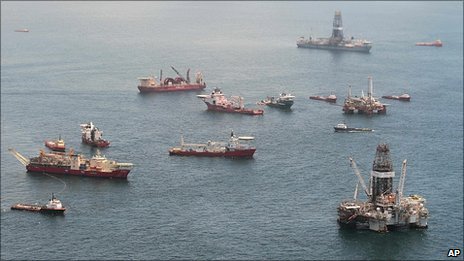 The US fears oil may be seeping from the ocean floor near the stricken Gulf of Mexico oil well.The official in charge of the clean-up, Thad Allen, said if a substance leaking from the seabed was found to be methane this may mean oil was also leaking.
The US fears oil may be seeping from the ocean floor near the stricken Gulf of Mexico oil well.The official in charge of the clean-up, Thad Allen, said if a substance leaking from the seabed was found to be methane this may mean oil was also leaking.
In the event the seepage was confirmed, he ordered BP to submit a plan to reopen the capped well to allow oil to be funnelled to the surface.
But BP says it would take three days to start this process.
During this time, the daily leakage of tens of thousands of barrels of oil, which had been capped last Thursday, could resume.
The well began leaking oil into the Gulf after BP's Deepwater Horizon oil rig exploded on 20 April, killing 11 workers, and capsized two days later.
BP had hoped the cap could stay in place until relief wells stopped the leak for good.
But with pressure readings from within the well lower than expected, scientists had raised concerns that oil could leaking into the surrounding undersea bedrock.
And in a letter to BP chief managing director Bob Dudley, Adm Allen said: "Given the current observations... including the detected seep a distance from the well and undetermined anomalies at the well head, monitoring of the seabed is of paramount importance...
"I direct you to provide me a written procedure for opening the choke valve as quickly as possible without damaging the well should hydrocarbon seepage near the wellhead be confirmed."
The flow of oil from the well was shut off by the cap at 1425 local time (1925 GMT) on Thursday and testing has continued since then.
Work on both of the relief wells designed to close off the well permanently is currently suspended because of the testing.
'Worst disaster'
The Gulf of Mexico spill has been described as the worst environmental disaster the US has seen.
The BBC's Laura Trevelyan explains why BP is being ordered to provide the plan
The subsequent spill has affected hundreds of miles of Gulf coastline since April, with serious economic damage to the region as tourists have avoided Gulf Coast beaches and fishing grounds have remained closed.
BP has put the costs of dealing with the disaster at over $3.95bn (£2.6bn).
It has already paid out more than $200m to 32,000 claimants. The company is evaluating a further 17,000 for payment and is seeking more information on 61,000 other claims.
British Prime Minister David Cameron is to meet Mr Obama in Washington on Tuesday, and BP - formerly British Petroleum - is expected to be a key topic of discussion.



